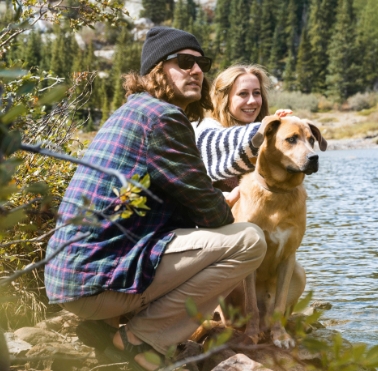Outdoorsy Dogs
Hiking Dogs
Hiking with your dog can be a wonderful and rewarding experience, but it’s essential to prioritize their health and well-being.
Below are some considerations for veterinary care when hiking with your dog.
Preventative Vet Checkup
Before embarking on a hiking trip, schedule a visit to the vet for a thorough checkup. Ensure your dog is up-to-date on vaccinations, and discuss any specific concerns or considerations related to hiking in your region.
Tick and Flea Prevention
Hiking trails often expose dogs to ticks and fleas. Consult with your vet about appropriate preventive measures, such as topical treatments, collars, or oral medications. Regularly check your dog for ticks during and after hikes.
Heartworm Prevention
Ensure your dog is on a regular heartworm prevention program. Mosquitoes, which transmit heartworms, are commonly found in outdoor environments. Discuss the most suitable preventive measures with your vet.
Nutrition and Hydration
Adequate nutrition and hydration are crucial for your dog’s stamina and health on the trail. Consult with your vet to determine the appropriate amount and type of food for your dog, and bring plenty of fresh water. Consider portable water bowls for easy access.
First Aid Kit
Pack a canine-specific first aid kit that includes items like bandages, antiseptic wipes, tweezers for tick removal, and any medications your dog may need. Your vet can guide you on what to include based on your dog’s health and potential risks.
Physical Condition
Consider your dog’s age, breed, and physical condition before embarking on a challenging hike. Puppies, senior dogs, or those with health issues may require special considerations. Gradually increase the intensity and duration of hikes to build your dog’s endurance.
Paw Care
Check your dog’s paws for cuts, abrasions, or signs of discomfort. Carry paw balm or boots to protect their paws from rough terrain. Your vet can recommend suitable products based on your dog’s needs.
Emergency Plan
Be familiar with the location of the nearest veterinary clinic or emergency facility along your hiking route. Save emergency contact numbers, including your vet’s, in your phone.
Weather Considerations
Be mindful of weather conditions, as extreme temperatures can impact your dog. In hot weather, watch for signs of heatstroke, and in cold weather, protect your dog from hypothermia. Consult your vet for guidance on specific breeds and weather considerations.
Behavioral Changes
Monitor your dog for any behavioral changes during or after hikes. If you notice signs of discomfort, lethargy, lameness, or any unusual behavior, consult with your vet promptly.
Snake Avoidance & Bites
Contact us to learn more about your area and the snakes you may encounter as well as preventative and in the field first aid tips.
Always prioritize your dog’s safety and well-being while hiking, and consult with your veterinarian for personalized advice based on your dog’s health and specific needs.


Water Dogs
Water dogs, or dogs that are specifically bred for water-related activities, such as swimming and retrieving in aquatic environments, require special veterinary care to ensure their health and well-being. Breeds like Labrador Retrievers, Chesapeake Bay Retrievers, and Golden Retrievers are examples of dogs often associated with water-related activities.
Here are some considerations for veterinarian care for water dogs:
Swimming Assessment
While many water dogs are natural swimmers, it’s essential to assess your dog’s swimming ability. Not all dogs are comfortable or skilled in the water, and some may need gentle introduction and training. Your vet can provide guidance on assessing and developing your dog’s swimming skills.
Ear Care
Dogs that spend a significant amount of time in the water, especially those with floppy ears, are prone to ear infections. Regularly check and clean your dog’s ears, and consult with your vet if you notice signs of infection, such as redness, odor, or excessive ear scratching.
Skin and Coat Care
Exposure to water can affect your dog’s skin and coat. Ensure thorough drying after water activities to prevent skin issues. Regular grooming and coat care, including checking for mats and tangles, are essential. Your vet can recommend specific grooming practices based on your dog’s breed and coat type.
Parasite Prevention
Water environments may increase the risk of certain parasites, such as waterborne parasites, ticks, and fleas. Consult with your vet to establish a comprehensive parasite prevention plan, including appropriate medications and preventive measures.
Water Safety
Educate yourself about potential water hazards, such as strong currents, algae blooms, or water pollution. Always supervise your water dog and be cautious about where they swim. If your dog ingests a significant amount of water, monitor for signs of water intoxication and seek veterinary attention if needed.
Joint Health
Water activities can be physically demanding on a dog’s joints. Regular veterinary checkups can help monitor joint health, and your vet may recommend joint supplements or specific exercises to support mobility, especially for breeds prone to orthopedic issues.
Hydration
While your water dog may be surrounded by water, it’s crucial to provide fresh drinking water during and after activities. Dehydration can still occur, especially if your dog is working hard in the water.
Diet and Nutrition
Consider your water dog’s energy needs and ensure they receive a balanced diet that supports their activity level. Your vet can provide guidance on the appropriate type and amount of food based on your dog’s specific requirements.
Emergency Preparedness
Be prepared for emergencies, such as accidental ingestion of waterborne toxins or injuries during water activities. Know the location of the nearest veterinary clinic, and have emergency contact numbers readily available.
Regular Vet Checkups
Schedule regular veterinary checkups to monitor your water dog’s overall health. These checkups can help detect and address any potential health issues early, ensuring a long and active life for your canine companion.
As with any dog, open communication with your veterinarian is essential. Discuss your water dog’s activities, any concerns you may have, and follow your vet’s recommendations for a tailored healthcare plan that meets the specific needs of your water-loving companion.



